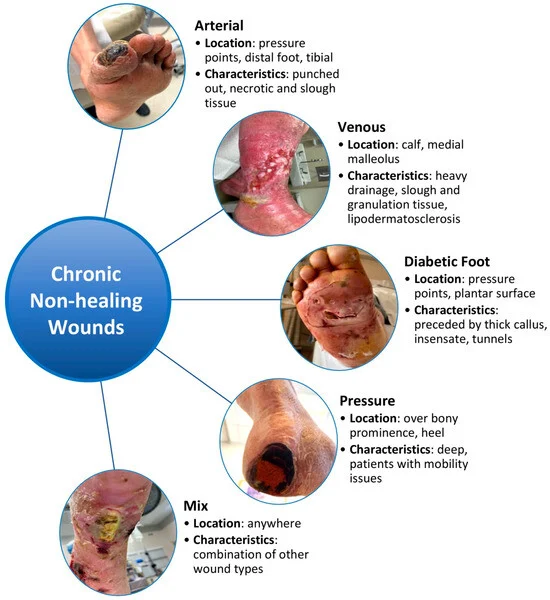
Ulcers, particularly peptic ulcers, are painful sores that can significantly impact a person’s quality of life. While they are often associated with factors such as H. pylori infection, stress, and certain medications, chronic health conditions can also play a crucial role in ulcer development and management. In this blog, we will explore how chronic conditions like diabetes and liver disease are linked to ulcers, the complexities they introduce in ulcer management, and effective strategies for patients with comorbidities. We will also highlight the importance of adopting a holistic approach to health.
Overview of Chronic Conditions Affecting Ulcers
Chronic conditions can contribute to ulcer formation and complicate their treatment. Here are two prominent examples:
1. Diabetes
Diabetes is a chronic metabolic disorder characterized by high blood sugar levels. People with diabetes are at an increased risk for developing ulcers due to several factors:
- Poor Circulation: Diabetes can lead to nerve damage (neuropathy) and poor blood flow, reducing the body’s ability to heal.
- Gastrointestinal Issues: Diabetic gastroparesis, a condition where the stomach takes longer to empty its contents, can increase the risk of ulcers by creating an acidic environment in the stomach.
2. Liver Disease
Liver disease, including cirrhosis and hepatitis, can also impact ulcer formation and healing:
- Altered Metabolism: The liver plays a key role in metabolizing medications. Liver dysfunction can affect how the body processes drugs used to treat ulcers, increasing the risk of adverse effects or suboptimal treatment.
- Increased Gastric Acidity: Liver disease can lead to alterations in gastric function, resulting in increased acid production, which may contribute to ulcer development.
How Chronic Conditions Complicate Ulcer Management
Managing ulcers in individuals with chronic conditions presents unique challenges, including:
- Increased Risk of Complications: Chronic illnesses can hinder the healing process and increase the risk of complications, such as bleeding or perforation.
- Medication Interactions: Patients with comorbidities may be on multiple medications, raising the potential for drug interactions that can affect ulcer treatment.
- Lifestyle Limitations: Chronic conditions often require lifestyle modifications, such as dietary restrictions, which may further complicate ulcer management.
Strategies for Patients with Comorbidities
For patients managing both chronic conditions and ulcers, effective strategies include:
- Collaborative Care: Working closely with healthcare providers, including gastroenterologists and specialists managing chronic conditions, ensures a comprehensive approach to treatment.
- Medication Management: Regularly reviewing medications with a healthcare provider can help identify potential interactions and optimize ulcer treatment. It is essential to communicate all medications being taken to avoid complications.
- Dietary Adjustments: Tailoring dietary choices to accommodate both chronic conditions and ulcers can promote healing. For example, patients with diabetes should focus on low-glycemic foods while avoiding spicy and acidic foods that may irritate ulcers.
- Monitoring Symptoms: Keeping track of ulcer symptoms and any changes in chronic condition management can help identify potential complications early.
Importance of a Holistic Approach to Health
Adopting a holistic approach to health is vital for individuals with chronic conditions and ulcers. This includes:
- Lifestyle Modifications: Encouraging regular physical activity, stress management techniques, and sufficient sleep can enhance overall health and support ulcer healing.
- Nutrition: Focusing on a balanced diet rich in whole foods, fruits, vegetables, and lean proteins can help manage both chronic conditions and promote gut health.
- Mental Health Support: Chronic conditions and ulcers can affect mental well-being. Seeking psychological support or counseling can help patients cope with the emotional aspects of managing their health.
- Education and Awareness: Patients should be educated about their conditions and treatment options, empowering them to make informed decisions about their health.
Conclusion
The link between chronic conditions and ulcer development is significant and complex. Understanding how conditions like diabetes and liver disease can affect ulcers is crucial for effective management. By employing strategies tailored to individuals with comorbidities and adopting a holistic approach to health, patients can enhance their quality of life and improve their ulcer recovery outcomes. Regular communication with healthcare providers and proactive health management are essential components in navigating the challenges posed by chronic conditions and ulcers.

